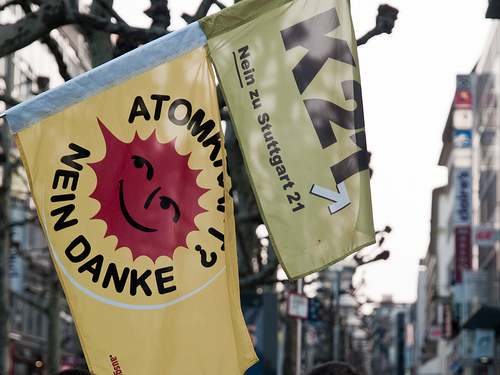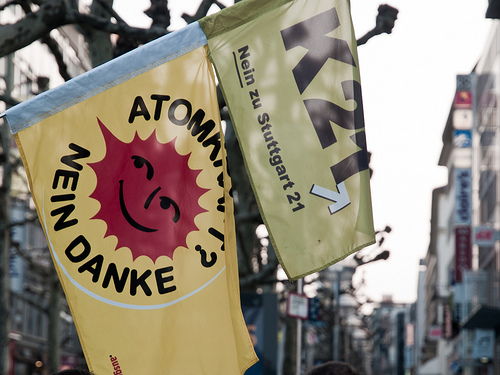 Photo: Dan ZelazoEver since Germany shut down eight of its nuclear power plants in the wake of the Fukushima disaster, nuclear proponents have raged against the decision. Their claim: This cannot possibly be good for the German economy, its energy security, or the climate.
Photo: Dan ZelazoEver since Germany shut down eight of its nuclear power plants in the wake of the Fukushima disaster, nuclear proponents have raged against the decision. Their claim: This cannot possibly be good for the German economy, its energy security, or the climate.
The latest example of this rage is a piece in The New Republic: “How Germany Phased Out Nuclear Power, Only to Get Mugged by Reality.” Before digging deeper into the arguments, let’s figure out just what reality we’re talking about.
As I’ve written before, Germany, Europe’s biggest economy, is aggressively pursuing a transition away from both nuclear power and conventional fossil fuels. It will likely encounter the challenges — and reap the benefits — of this strategy before other countries. Some analysts have hypothesized that Germany’s 20-year support for renewable energy would place a drag on the economy. However, Germany has rebounded from the financial crisis faster than many other countries around the world and is currently enjoying its strongest economic growth (and lowest unemployment) since its reunification 20 years ago. Renewable energy currently employs 370,000, compared to 50,000 in the coal industry (from mine to power plant). And Germany forecasts that its exports of clean energy technologies and expertise will continue to expand in the future. If the investment that Germany is making in renewable energy pays off, it is likely that Germany will remain the economic engine of Europe for decades to come.
Now let’s do a reality check on the grim “reality” that mugged the New Republic.
First, the author claims that “electricity prices have risen for consumers, and it could cost the country’s four operators of nuclear plants more than $40 billion simply to shut the nuclear reactors down.” Exactly. Each kilowatt hour of nuclear power is much more expensive than stated on customers’ utility bills. Shutting down reactors is only a small part of the lifetime costs for nuclear power, but still: It costs at least $1.4 billion to dismantle one reactor unit in Germany. Nuclear’s burden is even greater in the case of an accident, when taxpayers are stuck with the bill. Tepco, the operator of the Fukushima Dai-Ichi plant, just sought about $13 billion in public funds to deal with compensation claims.
Over the last 40 years, the German nuclear industry has been pampered with more than $230 billion in direct subsidies. Over the same period, renewable energy technologies have received just $56 billion [PDF] in incentives. Subsidies kept the price for electricity generated from nuclear energy artificially low. The argument of cheap nuclear power turns into a boomerang once the hidden costs of nuclear become visible. For economic reasons, nuclear should never have been regarded a viable option in the first place.
Second, the author wants us to believe that “Germany became a net importer of electricity almost overnight” after shutting down the eight nuclear power plants in March 2011. This is false. Germany is a long-time net exporter of electricity and continues to be one — even after Fukushima. In the first half of 2011, Germany exported 27.9 terawatt-hours (TWh) while it imported only 23.9 TWh, according to the Federal Statistical Office.
The explanation is simple: Germany has installed much more power-generating capacity than it needs for domestic consumption. Power demand ranges from 40,000 to 80,000 megawatts (MW), depending on time of day and year. Coal, gas, and renewables provide a capacity of 81,000 MW, even without nuclear power.
Since Europe has a common market, countries import and export electricity. Power is imported not because of a lack of supply, but as an economic decision to shop where prices are lowest. Thanks to this common market, the nuclear phaseout does not threaten German energy security. To the contrary: the shift to renewable energy and efficiency will increase energy security in Germany. After all, its nuclear fuel is imported from other countries.
Third, the article quotes an expert who claims Germany’s nuclear phase-out has already “caused a 25-million-ton annual increase in carbon dioxide emissions” by replacing nuclear with coal-fired power plants. The attentive reader will note that this claim undermines the previous one, but that is beside the point. The nuclear phaseout does not jeopardize Germany’s ambitious climate targets: reducing greenhouse gas emissions 40 percent by 2020 and at least 80 percent by 2050. If emissions were to rise due to the nuclear phase-out, the government would have to come up with compensating measures to reach these targets.
However, it is unlikely that emissions will rise. By the rules of the E.U. cap-and-trade system, emissions from the energy sector are capped. Even if coal were to replace nuclear capacity in Germany, emissions in the sector overall will still have to be reduced, either by shifting to more natural gas or by replacing old coal plants with more efficient ones. That’s the genius of a cap-and-trade system. Believe it or not, with that system in place, Germany’s nuclear phaseout will even cause emissions in other European countries to fall.
The decision of the Merkel government to shut down all nuclear power plants in Germany by 2022 may have caught some international observers by surprise. But it was no surprise if you followed Germany’s political discourse over the last decade. What Chancellor Merkel did after Fukushima — with the overwhelming support of voters — was go back to the timeline of the 2002 Nuclear Exit Law implemented by the Social Democrats and Green Party in agreement with Germany’s nuclear energy industry. By making it sound like Germany has suddenly gone off track, the author paints it as irrational, random, and thoughtless. Nothing could be further from reality.
Phasing out nuclear power is the right thing to do. The future of nuclear power was yesterday. Germany has entered the race to the age of renewables. If the Germans can power their highly competitive economy with wind, solar, hydro, and biomass power, than everyone else should be able to do it too. This is exactly what status-quo interests are afraid of. They better be.




